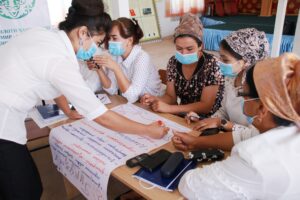Project report: PO MIR, Office for Initiative Development, Tajikistan
In this era of the Covid-19 pandemic, vulnerable families need our shared support
Grantee: PO MIR, Office for Initiative Development, Khujand, Tajikistan
Project: Reintegration of vulnerable groups affected by COVID-19 through their involvement in socially significant initiatives.
The ongoing coronavirus pandemic is affecting all of us and having an impact on our communications, our work, and our health and well-being.
The pandemic has proved dangerous for vulnerable families, including the elderly and families with family members with disabilities, disproportionately impacting their ability to obtain the information they need and to seek the social and other services necessary to maintain their health and general well-being.
Elderly people who were socially isolated due to their age, families with family members with disabilities and low-income families immediately faced a high risk of poverty, deteriorating nutrition, and difficulties in obtaining necessary medication. An absence of legal remedies, limited access to legal aid, and reduced social communication also directly impacted their health status.
The project, supported by The BEARR Trust focused on supporting vulnerable groups who are disadvantaged due to age, health problems, or other limitations affecting their lives, through community members themselves, to show that during the forced isolation caused by the ongoing COVID-19 pandemic, community members can mobilise themselves to help each other as much as possible.
Under this project, three self-help groups were formed in three rural communities of Asht district (Sughd region, Tajikistan) and capacity-building support was provided to members of these groups.


The training sessions on “Community mobilisation and the solution of social problems by community forces” and “Legal and psychological assistance to people in social isolation” conducted under the project showed that ordinary people in rural communities have little information on legal and social issues, including types of social assistance and procedures for applying for state support during the COVID-19 pandemic. The training was aimed at building the skills of self-help group members in providing counselling to vulnerable families on referrals for targeted assistance (to state social support structures). Another important point was the understanding by the self-help groups of the importance of coming together and working as a team to solve problems in their community.


The “Health Caravan” outreach campaign, organised in three communities with the involvement of medical specialists and a legal consultant, allowed vulnerable families and people who are socially isolated and unable to seek medical and legal services on their own to receive counselling. During the campaign, 499 people underwent initial medical examinations, received treatment consultations, and some of them were referred to specialised clinical services. Endocrinologist Lutfiniso Akhmedova (specialist at the regional endocrinology clinic in Sughd), who participated in the campaign, noted that most of the appeals to her were from women and families with young children with thyroid diseases who have not previously taken the problem to medical specialists, which shows the particular vulnerability of rural women and children in obtaining the necessary medical services in the community.


It is encouraging that prior to the campaign, trained members of self-help groups independently identified their need for targeted care, the anticipated areas for counselling, and prepared a list of categories of people who needed counselling by going around the homes of vulnerable families. The self-help groups themselves made arrangements with the local administration and organised a room for their activities, inviting local residents who needed counselling.
“By building solidarity in our community, together we can find new ways to support those who are more vulnerable and cannot cope on their own with the problems that came with COVID-19. I am encouraged by the work that I started to do as a member of the self-help group because I know that our help can make someone’s life easier”, Zamira S., Jamoat Shaidan (Asht district).
District Radio “Diyor” reported to its listeners about the implementation of the project supported by The BEARR Trust as an example of social participation and provision of assistance by community members to the most vulnerable. Members of the self-help groups are continuing their work helping vulnerable families, providing them with information on the types of social assistance available, and mobilising the necessary resources to help these families.


For those who are socially excluded and cannot move around or leave their homes because of their health, age (over 65), or other limitations, self-help groups continue to provide ongoing, in-home counselling. To date, 25 home visits have been made by self-help group members, including some counselling.
“My participation in the self-help group made me realise that there are a lot of people around us who need help. I did not notice it before”, Yulduzkhon H., Iftikhor Jamoat (Asht district).
Contact details:
Iroda Bobojonova, Chairperson
ibabadjanova@gmail.com
Asht district, Tajikistan
February 5, 2022

